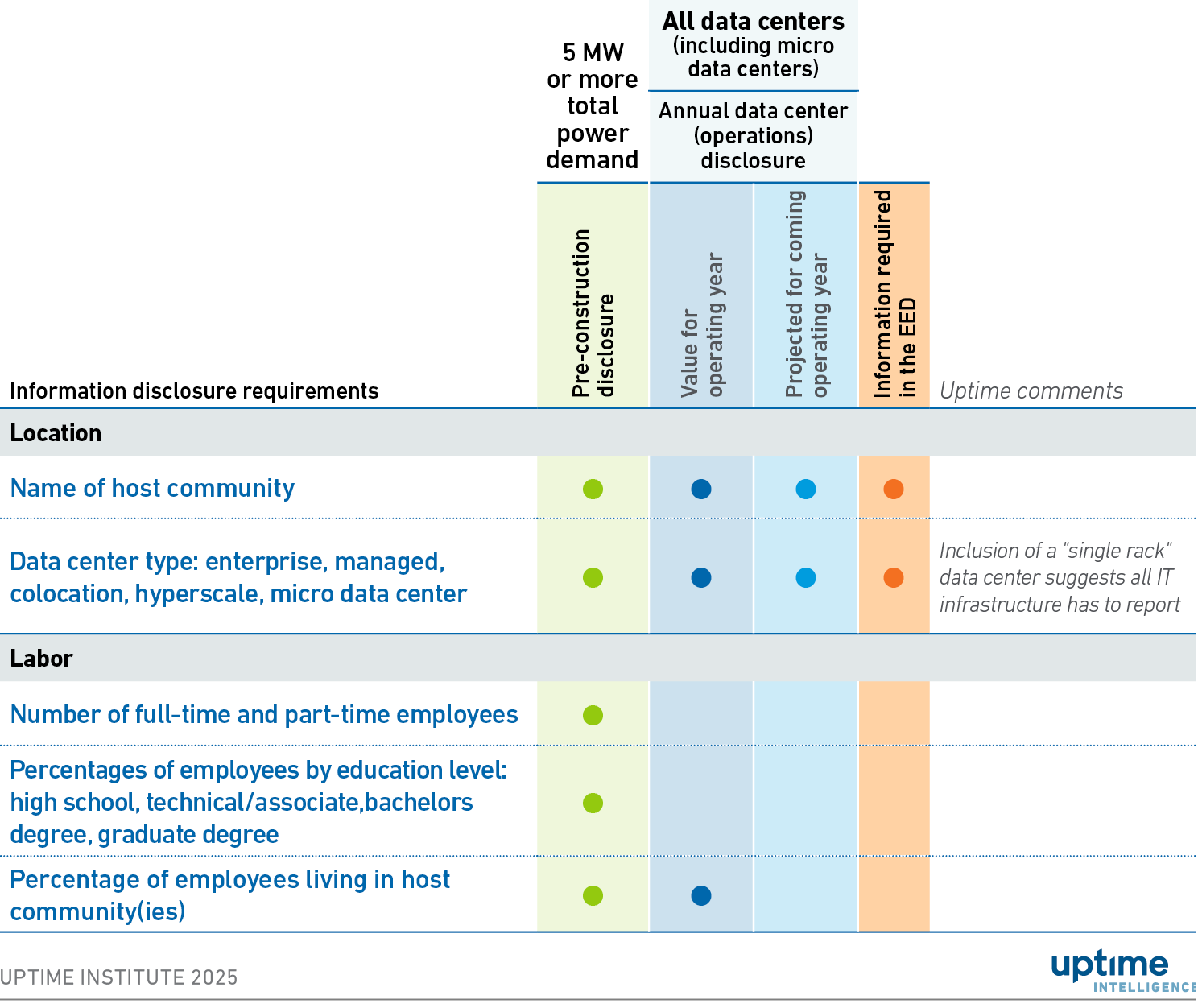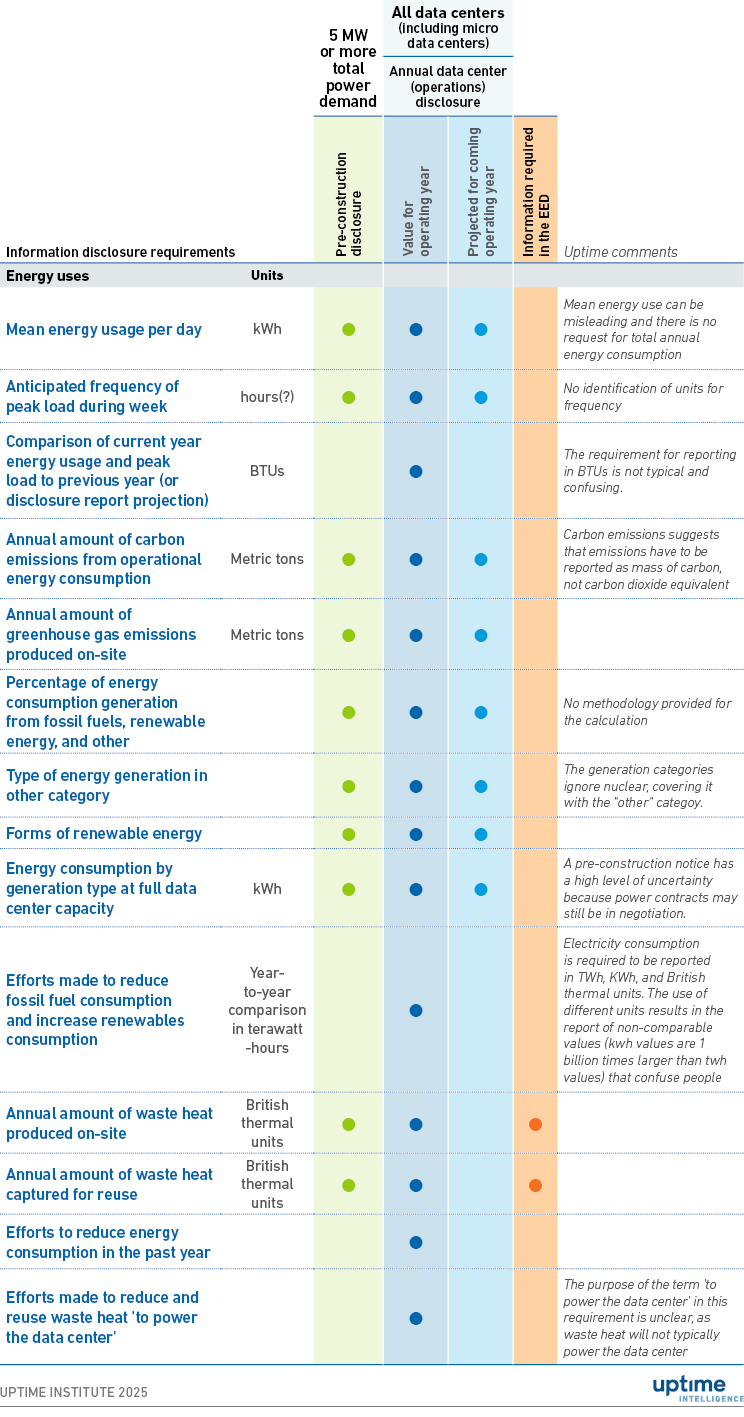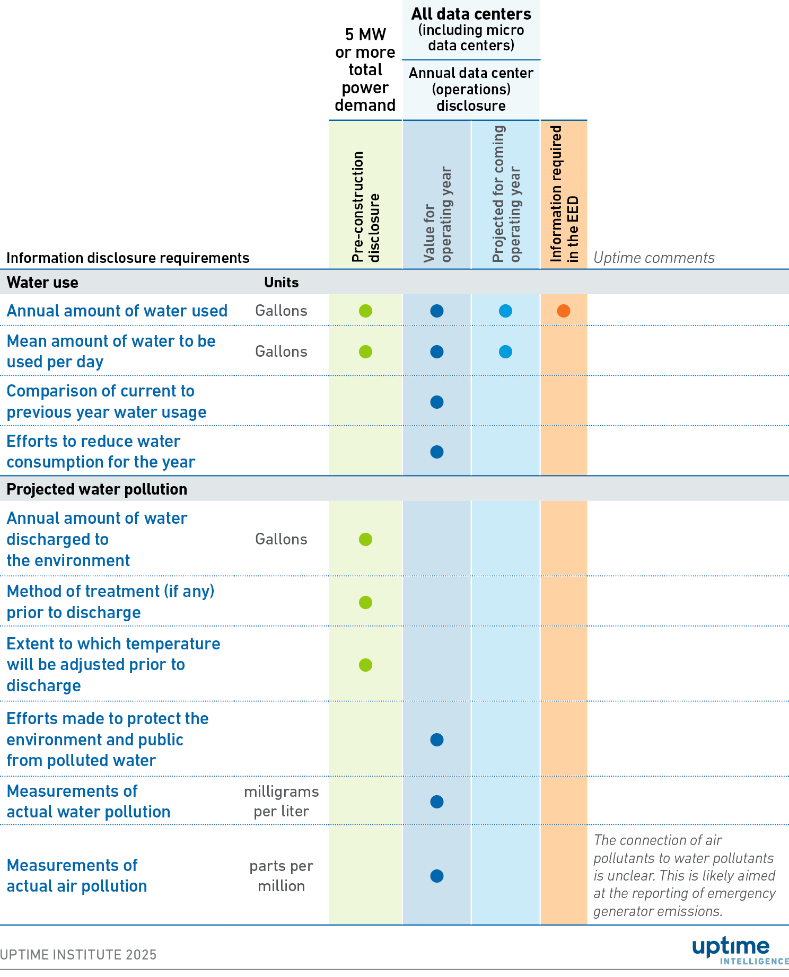UII UPDATE 331 | FEBRUARY 2025
Intelligence Update
US state drafts plan for data center regulations
Many US data center operators have remained complacent about the potential for regulations being imposed in the US. The recent change in the federal administration has reinforced the view that, unlike in Europe, regulatory requirements on data centers are not imminent.
State-level legislators are, however, becoming increasingly active. Data center reporting and performance requirements have been proposed but not passed in Oregon and Virginia. In December 2024, legislation was introduced in the New York Senate, setting requirements including pre-construction and operational information disclosure, specific quantities of renewable energy consumption, and subsidies to residential electricity consumers. Although the bill (Senate Bill S9960: regulation of energy consumption by data centers) is listed as “introduced – dead” on a legislation tracking website, the broad reach of its requirements should alert data center operators to the potential for future regulatory proposals.
Conditions and concerns
In the coming months and years, the rapid growth and local environmental and business impact of data centers will inevitably lead to greater legislative attention from both state and regional authorities, even if wider sustainability concerns are disregarded. Existing legislation from, for example, the EU, along with proposals from states such as New York, will be closely examined and, in some cases, adopted.
If this is the case, the New York example should cause concern. The legislation features imprecise and inconsistent definitions and requirements that may put data center operators on the defensive in public forums. The language of the legislative proposal raises several areas of concern.
It dictates that future data centers projected to have “the capacity to consume (sic) 5 MW or more at any moment” must report detailed, extensive projections of operating and employment data to the New York State Public Service Commission (PSC) before beginning construction.
Data reporting requirements
Location and employment
The legislation asks for reporting of the physical location and type of data center and the expected demographics of individuals employed at the data center (Table 1, Pre-construction disclosure).
Table 1 Proposed location and employment reporting requirements

Energy use
The legislation asks for reporting of the mean energy use per day, the anticipated frequency of the peak energy demand during the week (without asking for the value of the peak energy demand and the seasonal differences driven by changes in cooling demand), and detailed information on the electricity generation sources supplying the data center and heat reuse systems (Table 2).
Table 2 Energy use and heat reuse information

Water use and air pollutants
The legislation requests detailed projections of water use, water discharges and treatment methods, and emissions of air pollutants associated with emergency generator operation (Table 3).
Table 3 Water use, water discharge and air pollutant emissions information

Before submitting the data to the PSC, at least two public hearings must be held to review the data. The data reporting requirements appear to guarantee the public disclosure of the facility operating data in order to inform state and local permitting processes.
The legislation also states that all operational data center operators must submit an annual report to the Department of Environmental Conservation. The proposal defines a micro data center, which has one rack of no more than 150 kilowatts (kw) of power, as a type of data center, and an operator as an entity that runs a defined data center. Therefore, it appears that any facility with an installation of one server rack or more will be required to submit an Annual Data Center Disclosure with projections for the next year of operation (Tables 1 to 3). The reporting requirements vary significantly from those mandated in the EU’s Energy Efficiency Directive (EED), with only five of the 29 requirements covered in the EED.
The legislation requires one-third of data center energy consumption to be from renewable energy by 2030, two-thirds by 2035 and 100% by 2050. This requirement is complicated by the New York State Renewable Portfolio Standard (RPS). The RPS specifies that a specific percentage of New York’s electricity consumption comes from renewable sources, which has driven up the price of renewable energy credits (RECs). New York State REC prices ranged from $31 to $45 per megawatt-hour (MWh) in 2024, compared with $1 to $3/MWh for unbundled RECs from Texas, significantly increasing the cost of verifiable renewable energy consumption.
The renewable energy consumption requirements, combined with the need to add new generation capacity, raise concerns that data centers will increase the cost of electricity in their host communities. To mitigate the impact of these potential price increases on residential customers, the legislation directs the PSC to create a community discount plan that subsidizes the cost of electricity in host communities. The discount “shall not exceed twenty percent for the first five years of billing cycles”. This would be a controversial new addition because the discount plan is established as a condition of operation without the subsidy being based on an assessment of the facility’s projected impact on electricity rates.
The legislators are not satisfied with establishing the mandates detailed in the bill. The legislation authorizes the PSC and the New York Independent System Operator to determine reasonable energy consumption efficiency goals to govern the design and operation of data centers. The New York State Department of Environmental Conservation is given the authority to broaden and expand the data reporting requirements. Given New York’s history of stringent regulatory enforcement, these authorities are likely to be used extensively to manage data center operations of all sizes.
Observations
The proposed New York State Senate Bill S9960 is highly unlikely to pass. However, its mandates provide a glimpse into the likely direction of data center information reporting and operational performance regulations in US states that, similar to the EU, legislate and enforce strict regulations. Key takeaways regarding a likely data center regulatory framework in the US include:
- There will be extensive operational reporting, with an emphasis on energy use, water use, heat reuse and renewable energy consumption. Operators report aggregated information on these topics in their sustainability reports, but the regulations will focus on facility-level reporting.
- The regulations will grant authority to governmental entities to impose additional requirements. Operators should develop strategies and prepare data to advocate to these entities for reasonable requirements.
- Operators are likely to be required to subsidize electricity and water rates, to reduce the costs for host communities or the broader residential ratepayers. Their introduction into legislation has the potential for them to become an accepted “tax” on data centers.
Operators should closely monitor developments in the localities, states, provinces and countries in which they operate and begin building relationships with government organizations. Influencing policy is challenging but achievable, as evidenced by the revisions made to the updated EED in the EU.
The Uptime Intelligence View
The build out of data centers and their growing environmental and economic impact means regulations, such as the proposed New York State Senate Bill, will increasingly be proposed and become law. Some of this legislation may be poorly drafted, technically flawed or over-reaching in scope. Operators are strongly advised to track and guide the development of new legislation and regulations.
Note: The regulatory analysis provided in this Update is the opinion of Uptime Intelligence. Data center operators should validate the interpretations with their legal staff and any relevant regulatory authorities.

